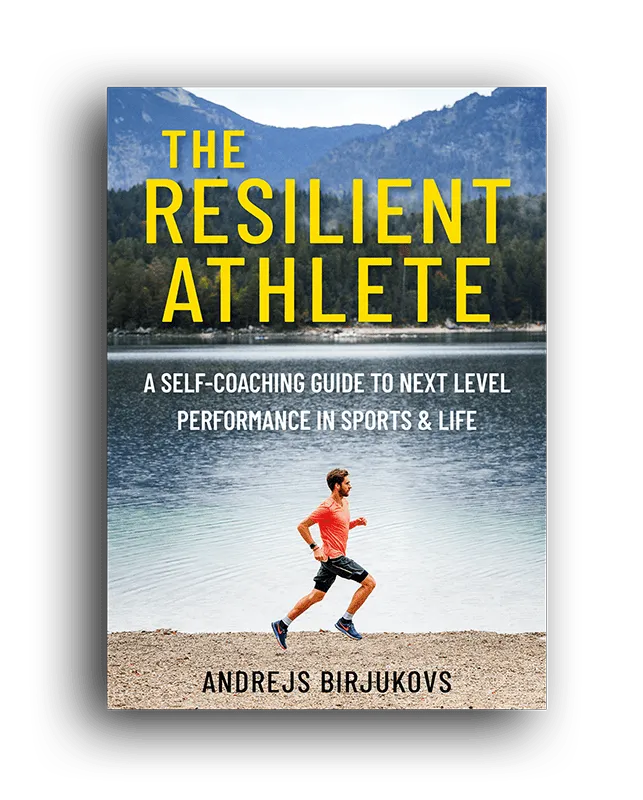Meditation For Athletes – 5 Powerful And Game-Changing Benefits
Being physically strong is not the only thing that makes an athlete great. Mental strength plays an equally important role. It helps athletes to cope with a tough training schedule, stay focused during races and avoid being mentally affected by competition. Building and maintaining that resilience is just one of the benefits of meditation for athletes.
Athlete’s biggest opponent is always inside. It’s always our fears & doubts that we need to overcome and setbacks & hardships that we need to triumph over. Staying mentally strong through these challenging moments is what shapes an athlete. And those who practice meditation are able to navigate those moments better.
Back in my teens I used to struggle to control my energy and emotions, which was very visible on my physical test results as well. Often my resting heart rate and blood pressure would jump for no apparent reason. The cardiac rhythm was inconsistent. I would experience sporadic energy bursts and periods of low morale. Things like that.
My sports doctor advised me to pay closer attention to mental training and suggested meditation as an option in particular. I can tell now that was one of the best well-being advice I ever got.
Benefits of meditation for athletes
A lot of people seem to be overwhelmed by the topic of meditation due to the amount of myths and misunderstanding surrounding it. Chanting words in different languages, burning incense, wearing robes. I can see how that can feel a little intimidating to someone not in the know.
In reality, meditation in itself is nothing more than the practice of actively controlling what you focus on.
Over time this seemingly simple, yet challenging activity extends the ability to focus beyond the practice. It trains the brain to stay fully focused on the activity at hand, resist distractions and become more productive. Chanting and burning incense for this is not necessary.

There are more and more elite and amateur athletes who recognize the value of controlling their mental state and start to include meditation practice into their daily routines.
Scroll down to learn the top 5 benefits of meditation for athletes.

The Resilient Athlete
A Self-Coaching Guide to Next Level Performance in Sports & Life
Are you aiming to become a resilient athlete who is able to withstand any pressure? Be able to jump on any opportunity? Take any challenge life throws at you head on?
Then this book is for you.
Learn moreBenefit #1 – Reduced mental stress and quicker post workout recovery
Mental stress can be very exhaustive. Even small stress responses (like being late or stuck in traffic) add up during the day and prevent athletes from using their energy efficiently. For someone with an intense training schedule additional mental stress essentially robs the energy from recovery and can lead to accumulated fatigue.
The body responds to any stress factor by activating a certain area of the brain – hypothalamus. That sends the signal for the body to produce hormones adrenaline & cortisol, which elevates heart rate, blood pressure and blood sugar level. It also forces the body to use glucose for energy instead of stored fat.
When the brain is stressed the body is stressed. We can’t relax and recover until the mind is at peace.
The fact that stress is generated in the brain means we can reduce it by altering our response to certain stress factors. Doing so will speed up our recovery between training sessions and allow us to train more and better.
The good news is that this ability to let go of stress is trainable through meditation. This practice essentially helps to clear the mind from unnecessary thoughts and focus on something positive instead.
In particular, according to this study meditation is effective at reducing the symptoms of anxiety, depression and perceived stress.
One of the most significant benefits of meditation for athletes is that it helps to recognize that thoughts are not facts and they don’t define our reality. Athletes who realize that and meditate daily are able to focus on the positive in any situation. This habit ensures they don’t waste precious energy on worrying or complaining.
Read also: 19 Strategies For Athletes To Reduce Mental Stress & Improve Recovery
Benefit #2 – Ability to focus better
We tend to evaluate athletes based on the physical performance they produce. However, more often than not it’s their mental capacity that impacts their success. How they set goals and can stick to them, how they deal with setbacks & fails, as well as how disciplined they are. All of that depends on how well athletes are able to focus.
As Tony Robbins puts it, where focus goes energy flows. Athletes need to focus on the goal and be able to fight distractions to develop their physical capabilities. Those who succeed at this are far more likely to follow the training plan, stay consistent and get better results.
The absence of such focus makes training process less effective. In particular, athletes who lack self-control are more likely to:
- Think about something else during sessions
- Spend more time talking (or using social media) than training
- Do something that interferes with the quality of training (poor sleep quality, unhealthy diet, staying out late and partying)
- Skip sessions altogether
That’s why many talented athletes struggle in their late teens and stop training. There are many distractions that take away the attention from training which requires more discipline and consistency than ever.
Meditation strengthens self-control, improves the ability to maintain focus on something and prevents the mind from jumping from one thought to another. Over time this practice trains the brain to recognize distractions and quiet them down. It won’t eliminate them, but it will get increasingly easier to be fully present, pay attention to the task at hand and stay focused on the goal.
Benefit #3 – Higher pain threshold
The ability to tolerate pain & discomfort and distance yourself from those is one of the traits of a great athlete. Success in any form is not possible without pushing past the obstacles. In fact, usually it’s the one who can ‘suffer’ the most that climbs the highest.
To be able to effectively navigate harder bits (physical or emotional) athletes need to pay close attention to training their mind as well as their body. And for that a consistent meditation practice will be much more effective than just enduring more pain in training.
In practice, meditation increases pain threshold by activating areas of the brain associated with self-control. Over time it also trains the ability to influence how much attention the brain puts on things – including pain.
Some studies show that meditation training helps to reduce perception of the pain and have a less stressful response to it. Another study showed that athletes can increase pain tolerance by merely accepting that the pain is there.
Personally, when things get physically tough I like to repeat the mantra I am not my body – my body doesn’t control me. This really helps me to distance myself from the pain and focus more on why I’m doing what I’m doing.
During my Ironman training I paid a lot of attention to training my mind to remain focused during long sessions. After all, the whole race you keep yourself from going too fast and preparing for the last 2-3 hours when the body is at its limit and suffers the most.

Benefit #4 – Improved mental resilience
All of our experiences and feelings are subjective and temporary. We feel a certain way (happy or sad, excited or demotivated) because our brain perceives it so. And that is very much in our control. Consistent meditation practice trains us to be mindful of what we think, what ‘color’ we assign it and what effect that has on us.
Mental state is not defined by external things. Whatever we think or how we perceive external events is always inside our minds. That view should never be pushed on us. Which is why the main opponent for the athlete is always within – it’s fears, doubts and insecurities that circle around in the head. If an athlete is not mentally resilient, then all the negativity will only get amplified.
Among other things, being mindful of your thoughts helps to recognize destructive thinking patterns and change them. In racing this is a big factor that determines how deep an athlete can dig and not get impacted by his doubts.
| Destructive mindset | Positive mindset |
| I am not ready for this | I can do this |
| Swimming in open water scares me | My fears don’t control me |
| Others look so much stronger than me | I trained for this and I’ll do my best |
| I can’t push myself any harder | I’ll push just a little bit more |
One of the benefits of meditation for athletes is the mental resilience that it helps to cultivate. The ability to cope with fear, quiet down the doubts and focus on giving your best. And doing so without looking at others.
In fact, in one of his interviews Arnold Schwarzenegger laughed about how he used ‘mental combat’ tactics on his opponents. He would make silly comments about how they looked and their internal doubts would make them push themselves too hard in training or force mistakes in competitions. And he is definitely not the only one who does that.
Benefit #5 – The ‘flow’ state
There are lots of things that athletes can’t control. Weather conditions, equipment malfunction, other competitors, judges’ decisions – you name it. Thinking about these variable factors (in training or during a race) can create doubt and affect physical performance.
This is where consistent meditation can help make peace with that. In particular, mindfulness meditation helps to distance yourself from the environment you’re in. Focusing on oneself (feeling the breath or your body parts) instead of on what happens around trains the mind to accept the situation it is in – not to stress about it.
And one doesn’t need to spend a year in a monastery or travel across Asia for months for that.
Being mindful means experiencing the moment. Being fully in control of your mind & body and able to channel that energy towards something. For athletes there’s even a name for this – the flow state.
The flow is the state of mind when you have no doubt about yourself. As a result, everything you do seems to fall in place by itself.
Being able to achieve that state is a huge thing for an athlete. That extreme focus & tunnel vision on the goal creates a snowball effect and a person in such state feels almost invincible. There’s nothing holding him back, he takes any opportunity, believes in himself and, therefore, succeeds. He is almost in his own world – the one with improved productivity and performance.
Athletes in the flow state focus on giving their absolute best instead of measuring themselves against their expectations. And this might not necessarily mean winning. However, crossing the finish line with absolutely nothing left in the tank brings more thrill than finish on top knowing you could have pushed harder.
Did you find this information useful? Share the post with others using the buttons below.
Have an opinion? Share via links below and tag @theathleteblog
Andrejs Birjukovs
GET A FREE TRAINING PLAN
Subscribe to my email list and get access to a free 4-week “back in shape” training plan
You’ll also get two full-body strength sessions and some other goodies!

How did I get here?
Hey there! My name is Andrejs and I am here to inspire, entertain and get you fit for any adventure.
I went from being an over trained pro athlete to an endurance coach sharing how to listen to your body and live life to the fullest.
Traveling, new sports & activities brought new meaning to my training and made it much more effective, fun and enjoyable. And I'm here to help you do the same.


